
Here’s a few of my favorite Christmas songs on my YouTube Christmas list. May they bless you this difficult 2020 Christmas season.
Merry Christmas, survivors!
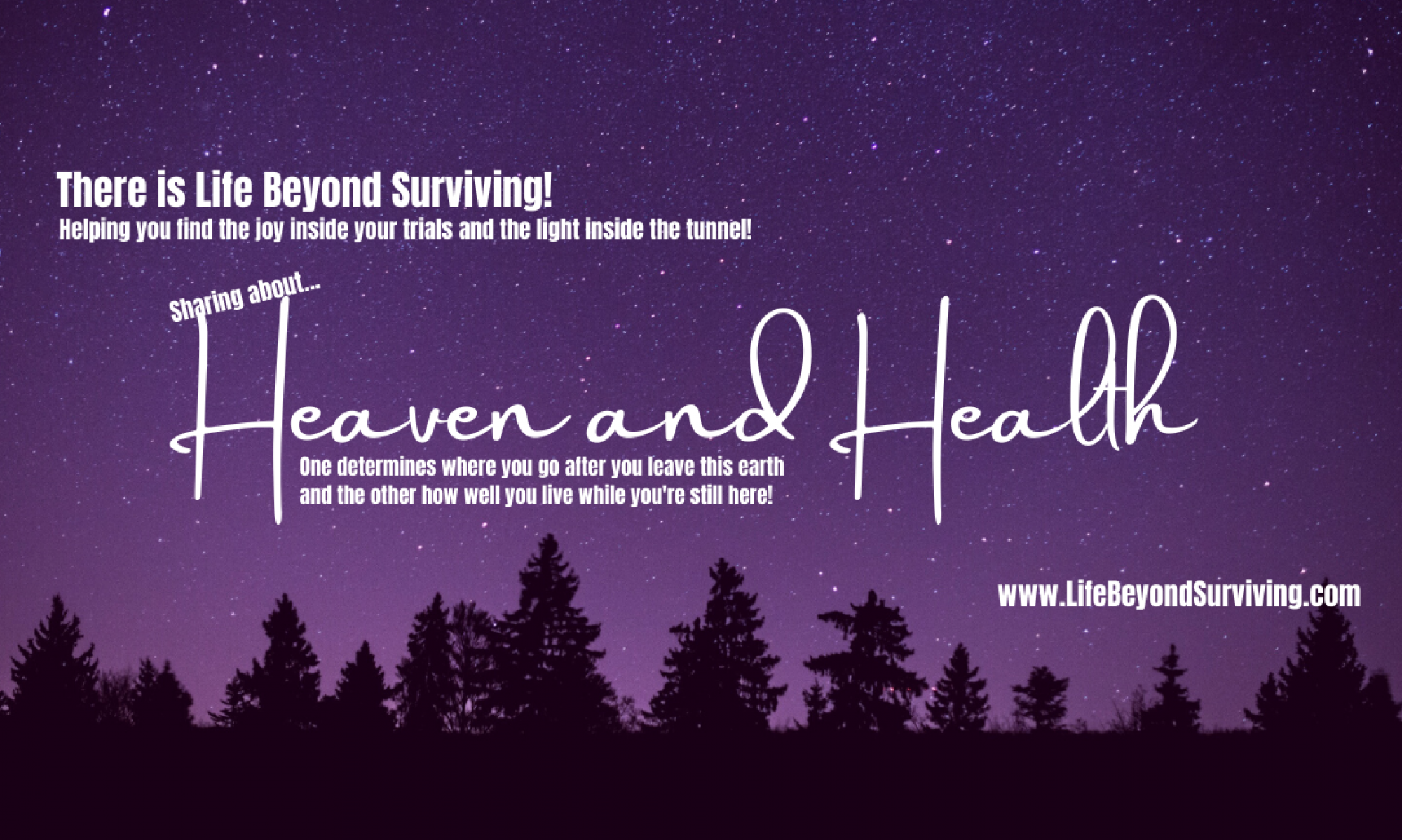
Finding the Joy in the trials and the Light INSIDE Your Tunnel!

Here’s a few of my favorite Christmas songs on my YouTube Christmas list. May they bless you this difficult 2020 Christmas season.
Merry Christmas, survivors!
All this month I’ve been getting back to basics so we can accept our chronic illness limitations, but grow through them and begin to have more joy in our lives again. I talked about the stages of grief and finding a new path that God would have for us. This week, I want to share how exactly we do that.
“But those who wait on the Lord Shall renew their strength; They shall mount up with wings like eagles, They shall run and not be weary, They shall walk and not faint.” – Isaiah 40:31
They say that “if you fail to plan, you plan to fail.” It’s never been truer than for those of us with chronic illness. It’s hard enough to plan our day with fatigue and pain. It takes a bit more to plan your life, but it is necessary.
If it’s not on my To Do List, it don’t get to done! I find it so much easier to get things done, work my plan, do what I feel God is leading me to do if it’s on a list that I can check off when I’m done.
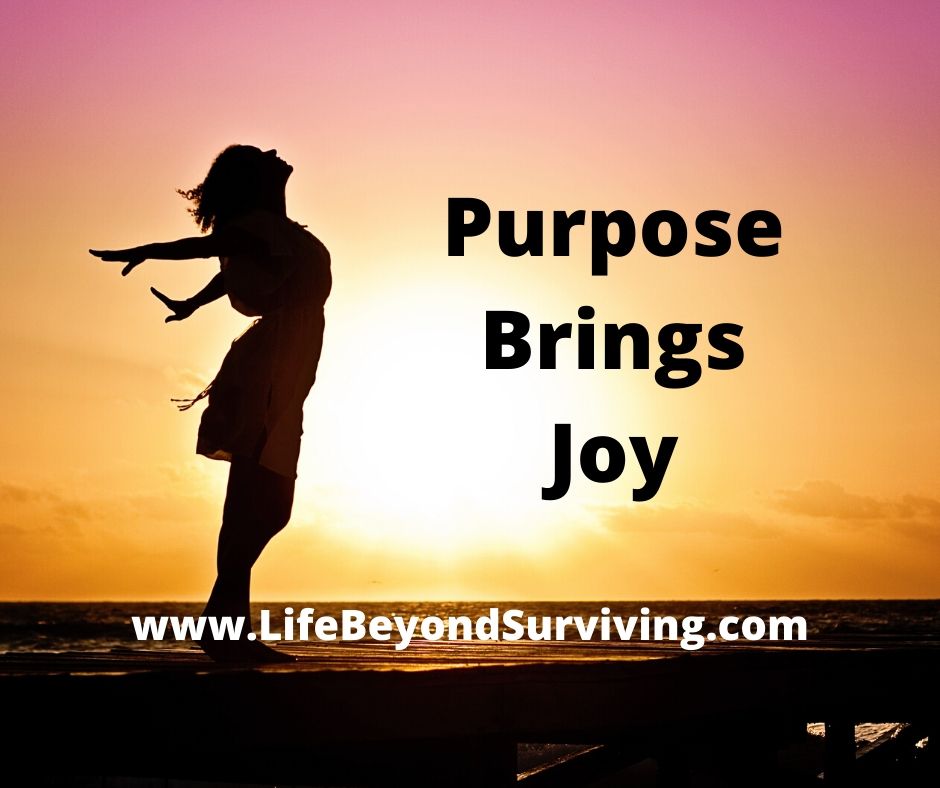
Once you know what you’re to do in each area of your life, you can begin to make those things happen by asking yourself questions. Do you need to change doctors to get better health this year? What steps can you begin to take to earn extra income? If it’s a new job, what steps can you take to get where you need to go? What things can you do to have better communication with your spouse?
Make a commitment to keep working your plan. Write it down where you can see it, look at it each day, work toward it each day. Having a goal and actually taking steps to move forward is what I found brought my joy back. It’s not always easy. In fact, it’s hardly ever easy. But it is worth it because it’s what God has for me and gives me purpose.
“But those who wait on the Lord Shall renew their strength; They shall mount up with wings like eagles, They shall run and not be weary, They shall walk and not faint.” – Isaiah 40:31
What is it for you? How can you take steps toward your purpose and joy?
“Therefore, if anyone is in Christ, he is a new creation; old things have passed away; behold, all things have become new.” – 2 Corinthians 5:17
We’re getting back to basics this month. That old saying, “There’s light at the end of the tunnel,” never sat well with me. I’ve shared this before, but if our tunnel is chronic, it usually doesn’t end this side of heaven. That means we have to find the light inside our tunnel and last week we began that process by talking about the five stages of grief as it applies to those of us with chronic illness.
The five stages of grief may seem insurmountable at the time, but I’ve found that what comes next is the hardest part because once you get to acceptance, then what? What’s next? Next, you have to learn to live with it and grow through it.

This can seem impossible because you have your ideas of what life should have looked like, should have been, work you should be doing except for limitations imposed by your chronic issues. But how you allow God to mold you and change you into the life He has established for you will make all the difference.
Instead of looking at your past hopes and dreams and continuing to grieve for what will never be, I’ve found that it is far more positive and uplifting to allow God to guide me to the work he has for me in my present state. God always knew how my life would turn out. It wasn’t a surprise to Him, just to me. I figured, God created me and He has a plan for my life, so if He knew this, He must have work for me that I cannot see at this time.
The first step is to ask God for guidance and pray to hear His direction. I had been writing since I was nine years old. I had dreams of becoming a songwriter. Well, actually at that age, I had dreams of becoming a famous singer. As I grew up, my life changed and so my dreams changed. For me, they changed from writing songs to writing speech communication books to writing about chronic illness. The writing remained the same, but what I did with the talent the Lord blessed me with changed.

For you, it might be a more distinct change from something like working outside the home to selling your artwork. But it isn’t just our work life that changes when we have chronic illness. It’s every area of our lives. So…
The next step is to establish what would help you in all the areas of your life: health, family, career, and ministry. I went over this extensively in my series on Chronic Illness New Year’s Resolutions. You can click on each of those and look through those areas of your life for ideas.
After you know what you can change, adapt, and adopt in these areas of your life the final step is what I’ll be talking about next week so stay tuned!
Now that you know a bit about me and why I’m sharing my thoughts on chronic illness here, let’s get back to the basics of why I started this blog in the first place. In the beginning, when you and I were first diagnosed with one or any of all of the chronic issues we have, we went through the stages of grief.
“The Lord is near to those who have a broken heart,
And saves such as have a contrite spirit.” -Psalm 34:18
Whether you did it quickly or you are still in one of the stages today, it is something we all contend with when we are given a diagnosis that affects the rest of our lives. You’ve heard that it isn’t what happens to you, but how you handle it that matters. Well, I do know from experience that it’s easier said than done but allow me to give you the benefit of my experience.
If you look at your diagnosis as a life sentence, you are going to see all the limitations and all the problems that come with it. However, if you look to any opportunities, experience, education, and what you may gain from having a chronic illness, you’ll see all the good that God has put there for you.
If you can’t see it now, don’t worry. It’ll be there when you’re ready to do so. It all goes back to the beginning and those five stages of grief following any difficult trial we endure. And here they are:
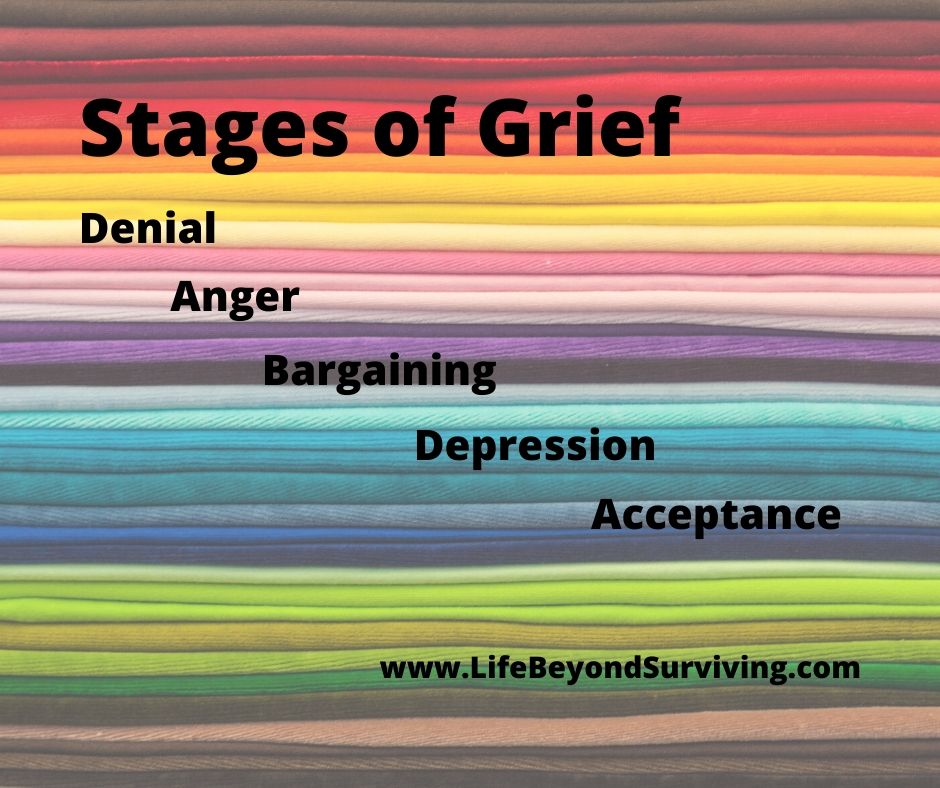
The first stage is denial. In my experience, this stage can go on for anywhere from a few hours to a few years depending upon what it is you are to accept and where you are in your life at the time.
When I was diagnosed with hayfever, I thought the doctor was off his nut. I didn’t sneeze. I had a sore throat! He never explained and I never asked so for many years I denied it was a problem. Only after being diagnosed with several chronic issues, did I realize why that doctor came to that conclusion. Hayfever isn’t just sneezing! Wanna guess what it can also be? Yup!
By the time I was diagnosed with Fibro, I had known something was not right with my energy and pain for YEARS! That diagnosis didn’t go through a period of denial at all. Other diagnoses took some form of denial of different lengths. Your mileage may vary.
The next step is anger and this is one that I tend to come back to from time to time when I’m in a dark place. Why me?! Why ALWAYS me?! So and so doesn’t have half these things to deal with. I already have tons of things…why me again?!
When I realize that being angry only uses up more energy, I can do things that snap me out of it and give me a more positive and proactive outlook. I also find that those so and so’s I thought never had to deal with XYZ had to deal with something else I never had to deal with. Either way, I come to a point of letting go of the anger to get on with what I need to do and what I can do.
The third step is bargaining. Bargaining with God that if He heals you, you’ll be better, do better. It’s where you’re trying to get your old life back. In a way, this brings false hope that you can achieve that.
While God can do anything, He doesn’t always do what we want or when we want it. I know God can heal me completely, but I don’t know when or if He will this side of heaven. Meanwhile, I have a life to live as best I can so I move on through the grief stages to that end.
The fourth step of grief is depression. That’s another one of the steps I find myself going back to at times. Why me, Lord and now what? I think we all need to sit with this for a time (may it be a few days or a few months) before we can move on from here.
Early on, it took much more time to move out of the depression phase. At this point in my life, I find myself in depression for just a few hours before I can move on again to the next step which is the BEST step. Every time there is a glitch in my health issues, a new diagnosis, a financial bump along the chronic illness road, I find myself back in the depression step, but for a shorter and shorter time.
Don’t get too upset if you find yourself here again. It’s a fallen world and stuff happens. Just don’t hesitate to work your way through it to the final step where you can see the joy, find a new purpose, and bring meaning to it all.
The final step in the stages of grief is acceptance. This is the phase where you have come to terms with what has happened, but you can focus your time and whatever energy you have on finding meaning and purpose in your life.
“He heals the brokenhearted And binds up their wounds.” – Psalm 147:3
There are a surprising amount of things you can accomplish if you allow the Lord to direct your steps. It takes working through all these steps first in order to hear God. Once that happens, you need to keep an open mind to what the Father is leading you to do. I have been amazed at the things I’ve been able to do that have helped others and taken my mind off of what I can’t do and put it on what God can do through me–even though I have limited energy.
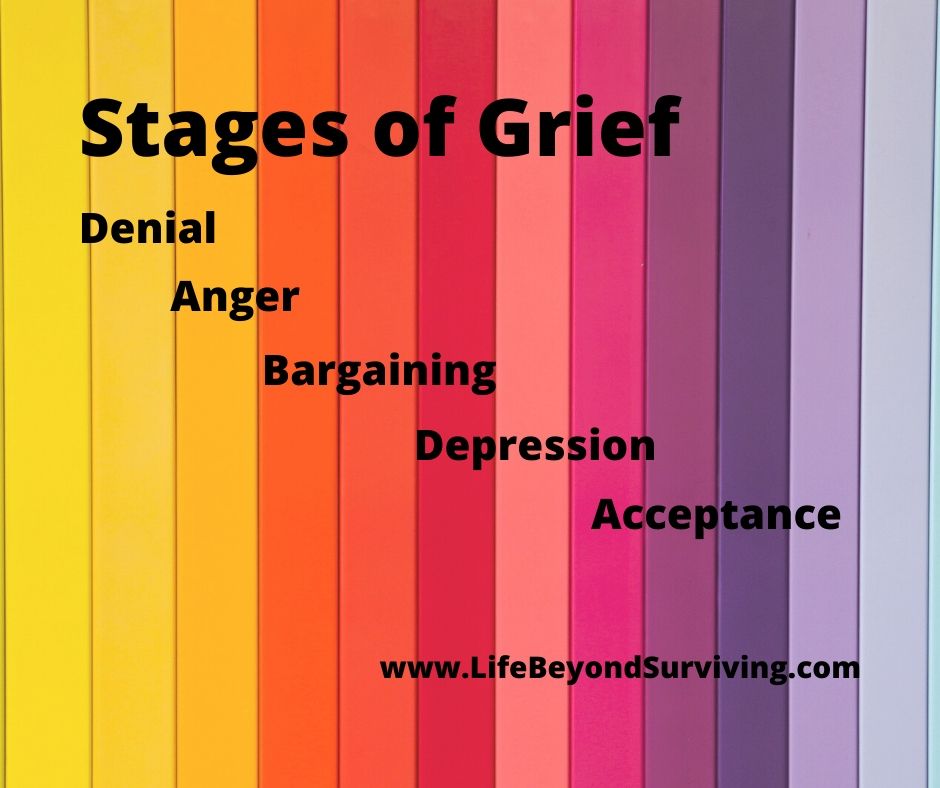
There are two final things I’d like to put to you. The first is that the stages of grief are just a bit different for accepting a chronic illness as opposed to something like blindness or even cancer. People understand what it must be like to deal with blindness and they have a heart for those who are going through cancer…or at least they will accept them as a real problem. When you are dealing with a chronic issue that people don’t understand, they also don’t understand why and how you’d be going through these stages of grief.
Finally, I want to point out that acceptance doesn’t have to mean you give up or that God won’t heal you. Acceptance means that you have come to terms with how things are. You can have acceptance of a trial without giving up and thinking you’ll never get better or never be productive or that God will never heal you.
I know that God can do anything and He answers all prayer. However, I also know that sometimes His answer is yes, sometimes it’s no, and sometimes it’s wait. I’m waiting to be healed (whether in this life or in heaven), but I’m doing all I can to live my best life with God’s help.
Which stage are you currently in? I’d love it if you’d share your experiences. Next week, I’ll talk about once you get to acceptance, what next? Stay tuned!
I thought I’d start off this year getting back to basics. However, in case you’re just joining me at Life Beyond Surviving here in 2020, I thought I’d start at the beginning of how and why I started this blog. I’ve always sought to be understood because I’ve never been able to fit in with the crowd. My life has always been a bit quirky. I guess you could say I’m not your average Jo…Jo!
I’ve always been different, weird if you will. So, I understand how important it is to be supported for who you are and the different circumstances you find yourself in. That is the essence of chronic illness, isn’t it? We don’t feel most people get us. Sometimes when you have been through so much you find yourself asking God why. Why me? Why so much hardship? Why can’t I just be normal?
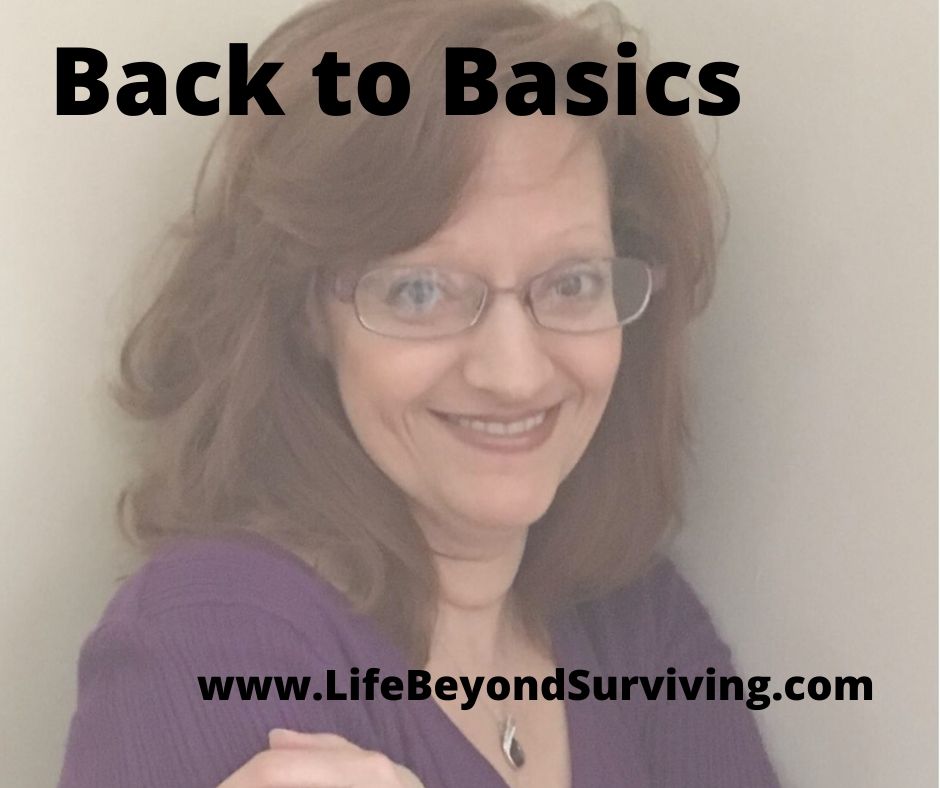
Why? In my case, I think it’s because I can help others…and I have never been normal…
I’m only 5′ tall, wearing children’s shoes, hats, and gloves. I used to sit on a telephone book in order to see over the steering wheel.
I was born to Atheists of Jewish descent, married a nonpracticing Catholic and became a nondenominational Christian because of Amway meetings and a Jehovah’s Witness that came to my door.
I’m an older mom having had my first at 27 and my second and last child at 36. I didn’t vaccinate my son though I did my daughter. Both my kids are incredibly intelligent. My son is that as well as Autistic or what they used to call Asperger’s.
I chose to homeschool my kids and for seventeen years we fielded all sorts of questions about socialization and getting into college. In case you’re wondering, they both were able to hold their own during the inevitable inquisitions from cable guys to relatives and went on to elite universities.
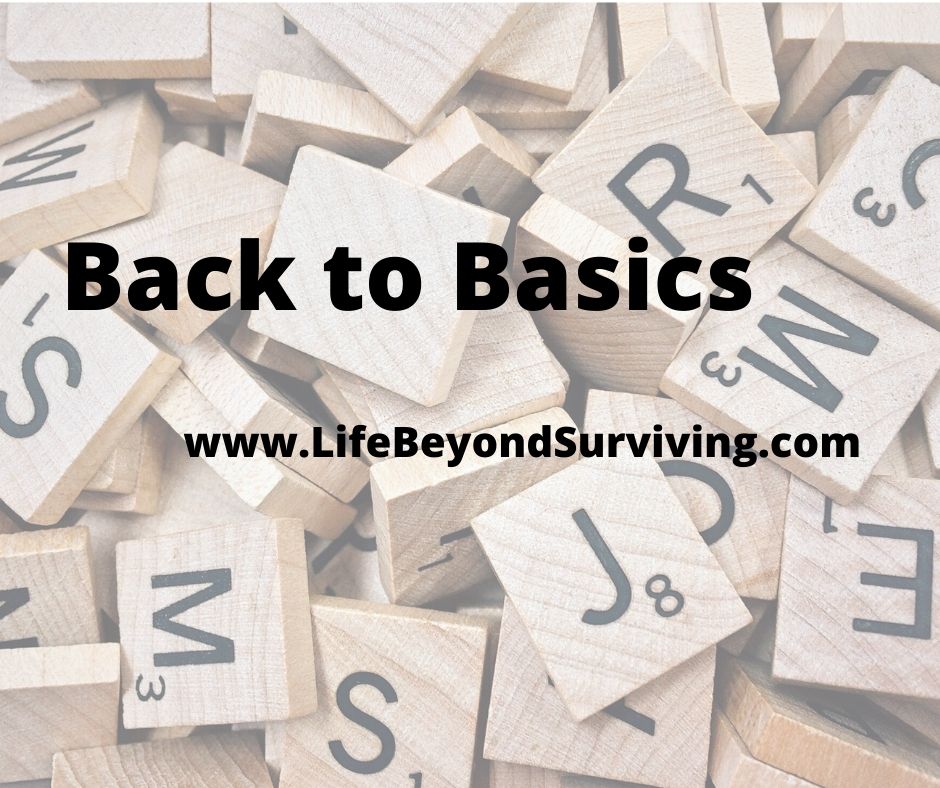
I’m weird in my medical history as well. Having had Fibro since I was a teenager and several other issues shortly after giving birth to my son at 37, I’m all too familiar with the misunderstandings that chronic illness has in the general community.
In addition to Fibro, I’ve struggled with perimenopause hot flashes for over twenty years. I also have Essential Tremors, Arthritis, Osteoporosis, and I can’t even remember all the rest. In addition, I’ve had nine surgeries in my lifetime. Five of them in a 2.5 year period of time including one due to cancer.
I’ve been married 33 years. I’ve been a mom for 30 years, I homeschooled for 17 years and I’ve had chronic illnesses spanning most of my life. I have a wealth of knowledge about several topics and how to do them with chronic illness.
“But do not forget to do good and to share, for with such sacrifices God is well pleased. ” -Hebrews 13:16
My heart is to share my knowledge and support others who are struggling with chronic conditions. My mission is to help them see the joy, the light, God’s light not just at the end of a tunnel (trial) they might be going through, but INside the tunnel (during the trials that are so long they don’t end this side of heaven).
Last week, I talked about why it’s impossible to be Polly Positive all the time and that it’s normal and even healthy to be negative at times. It’s normal to allow yourself time to be sad or angry, just don’t move there permanently.

Knowing this and doing it are two different things though because you have to learn to respond to Polly in one way or another. So, what is the best way to respond to Polly Positive when she strikes? How you choose to respond is going to be different depending upon your personality, your mood, and what was said, but I do have some ideas. It’s best to have a few options in mind for when brain fog or anger sets in. Here are a few ideas for you.
My best advice for times when something is said in passing or it’s someone new is to ignore. Silence is a great option because it requires little effort. It also doesn’t require any thought on your part and is a fairly quick resolution. I let the other person think what they want as long as I don’t need to expend any effort. This is my go-to option for when I’m tired, frustrated, or don’t really care what the other person thinks of me because I’m probably never going to see them again anyway.
Method number two is to gently remind. If I have more time, Polly is really pushing the issue, or she’s doing it in front of friends who are of the same opinion that it’s possible to be positive every moment of your life no matter what. “Everyone gets frustrated (or angry or down or sad) once in a while.” is a great response because most people would have to agree. “I just need to vent.” is another great one because most have felt this way too. “It’s not being negative to feel down once in a while; it’s only negative if you live there.” is another great one. Find something you feel comfortable with and have that at the ready just in case you happen upon Polly at some point.
Sometimes this can lead to a more lengthy discussion of what negative really means and if you’ve got the time and inclination to get into this discussion, by all means, do! However, there are times when it’s too taxing to get into it, especially if the one you’re talking to is just not willing to listen. It’s in these situations that I say something like, “If you dealt with all of the issues I have to, you might feel differently, but I just don’t have the energy to discuss it with you right now.”
Whenever I see a person who is unwilling to listen to reason, I deem that person toxic to my well being and I walk away from the situation or the person for a while or for good. This is an extreme situation and I don’t find this often, but it is an option you have. You should never feel that you need to put up with the stress of someone who is constantly berating you for not living up to whatever perfection they require. I haven’t had to use this technique too often, but I give myself permission to do so, if necessary.
My only caveat here is if that toxic person is a close relative or lives in your home. If that is the case, I suggest you ask them to put themselves in your shoes and/or have them go with you to your doctor’s appointment and have your doctor explain it to them.
*I do understand that there are still some doctors who don’t believe their patients. If that is the case, my prayers are with you.
What are things Polly has said to you that were unhelpful? How did you respond? How would you wish you had responded? How can that help you in the future?
The holidays are a time for getting together with friends and family. Many’s the awkward discussion I’ve had when I’ve been asked questions for which there was no acceptable answer.

So many well-meaning friends will tell you to just be positive, don’t speak negative into your life, and don’t complain. I’ve not found this helpful or biblical or sustainable or…healthy. While it is true that what we focus on we bring to our lives, nobody is able to be Polly Positive all the time and trying to do so leaves you frustrated, dejected, and that’s not very positive, is it?
What happens to you when you try to be Polly all the time? You see yourself as a failure because you can’t. You see more negative because it’s a knee-jerk, resentful reaction to Polly Positive’s comments. You begin to one up because you have a need to prove you have the right to be sad or angry. And you do!
You have every right to feel the way you feel. Chronic conditions are so frustrating and depressing because they are…wait for it…CHRONIC! It’s so much easier to deal with things when you know they’ll likely end in a while. I remember feeling awful when I had the flu for a few weeks, but I don’t recall feeling disillusioned with life. I knew that I just needed to wait a few more days or a week and I’d feel better.
Wanna know something else? Allowing yourself to be Negative Nelly and vent for a while, actually helps you to pick yourself up to Polly’s happiness level. Falling down isn’t fatal if you can find a way to pick yourself back up. Allowing yourself a time of grieving your loss of a healthy life isn’t fatal unless you live there and don’t let Polly tell you otherwise! I’d be willing to bet she’s had some negative moments she’s not talking about.
Next week I’ll share how you can answer Polly Positive.
 It’s been a long series, but I hope it’s helped you deal with Survival Mode a bit better. My last tip for Getting Out of Survival Mode is to make the invitation. Often it’s easier for others to come to us than it is for us to get out to go somewhere. It’s not always the case because then you’ll probably need to host, but it can be very beneficial for a few different reasons. First, let me share what I originally wrote about this:
It’s been a long series, but I hope it’s helped you deal with Survival Mode a bit better. My last tip for Getting Out of Survival Mode is to make the invitation. Often it’s easier for others to come to us than it is for us to get out to go somewhere. It’s not always the case because then you’ll probably need to host, but it can be very beneficial for a few different reasons. First, let me share what I originally wrote about this:
18. Invite others over so you don’t have to go anywhere if that is easier for you. It is for me.
I invite people to come over to my house to visit as often as I can instead of having to drive out to them. It’s more taxing for me to have to plan and execute a car trip out than it is to have someone over for lunch. You may find it different for you, but this works for me.
There really are several parts to this. Making the invitation, instead of trying to get out, helps those in trial for several reasons:
If you find yourself in trail, take a look back at this series (scroll back to the first in the series) and read them over and over as you need them. Joy is around the corner, even if your trial isn’t over. You just need to make some changes, surround yourself with those who understand (check out LifeBeondSurviving.com ), and take some time to look for the joy hidden inside the trials each day.
I hope you found some of what you seek inside these articles. Stay with me for more on how to find the joy and get through life’s trials. 😀
 This series is quickly coming to a close. This week’s step is all about listening to your body. If your issues are health-related (or even if they aren’t), trials can bring with them overwhelm and that means getting fatigued. It’s important to keep your energy up when you’re in trial so you can better handle what life likes to throw at you. Here’s what I wrote initially:
This series is quickly coming to a close. This week’s step is all about listening to your body. If your issues are health-related (or even if they aren’t), trials can bring with them overwhelm and that means getting fatigued. It’s important to keep your energy up when you’re in trial so you can better handle what life likes to throw at you. Here’s what I wrote initially:
17. Schedule naps or take them when you need them
Sounds like a no-brainer, but chronic illness usually means we get sleepy or tired–especially at about 3pm. I used to schedule a nap around that time because I knew I would be good for nothing unless I did. Sometimes I have to be flexible and nap at 9am if I wasn’t able to sleep much the night before. Now this works out great if you don’t work or work from home. Those of you who work outside the home, will not find this helpful unless your boss is okay with your head down on your desk at 3pm every day.
It’s not just naps, but finding ways to keep your energy up during trials that can be very tricky so here’s some things to watch out for that can cause more fatigue:
What things ZAP your energy? What steps can you take to minimize or overcome them?
 Just three more steps to talk about in my series called 18 Steps to Getting Out of Survival Mode and this week’s is reminders. Here’s what I wrote in my original article:
Just three more steps to talk about in my series called 18 Steps to Getting Out of Survival Mode and this week’s is reminders. Here’s what I wrote in my original article:
16. Reminders on computer or iphone
I used to use paper lists, but brain fogged minds often lose the list. So I began using my Outlook Calendar. When my computer was zapped by lightning, I transitioned to my phone, which was better for me because it has a loud tone that was near me when it went off. I can’t tell you how many times I came upstairs at 4pm to find my computer had reminded me to eat lunch.
Technology’s a wonderful thing! There are more ways to remind yourself to do things than there are people in the world. Find one that works for you. Find several if that’s what it takes. If technology’s not your thing and you love notebooks, use them. Whatever works for you.
I can’t tell you how much pressure it takes off of my already fried brain to know I don’t need to keep certain things in my head for very long…not that I have as much control over that as the years roll on! Whether your brain is overloaded due to age or trails, this is the one thing that will help you keep on track and not have to experience that old familiar heart wrenching, “OH SNAP!” moment when it’s too late to do something that went critical four days ago!
What kinds of things should you leave to a reminder and what things should you trust yourself with? Well, that all depends upon you. Take inventory of the things you tend to forget. There was a time I couldn’t even remember to eat lunch so that got added to my reminders. Here’s a list of things to get you started, but lest you think they are too simple to bother with, let me remind you that reminders have saved this old gal MUCH and that’s why these things are on the list of things to put on a list.
What could you schedule in to remind yourself of that would ease your already burdened mind? Put it in!